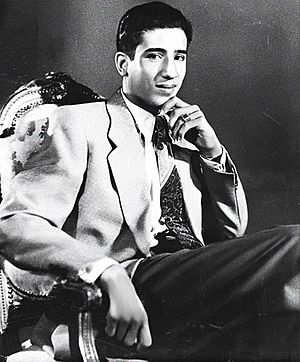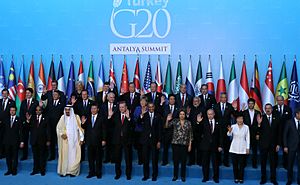Salman of Saudi Arabia facts for kids
Quick facts for kids Salman |
|||||
|---|---|---|---|---|---|
| Custodian of the Two Holy Mosques | |||||
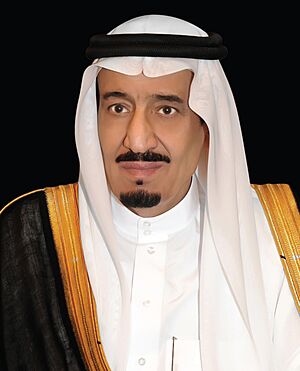
Official portrait c. 2019
|
|||||
| King of Saudi Arabia | |||||
| Reign | 23 January 2015 – present | ||||
| Bay'ah | 23 January 2015 | ||||
| Predecessor | Abdullah | ||||
| Crown Princes |
|
||||
| Prime Minister of Saudi Arabia | |||||
| In office 23 January 2015 – 27 September 2022 |
|||||
| Preceded by | Abdullah bin Abdulaziz | ||||
| Succeeded by | Mohammed bin Salman | ||||
| Crown Prince of Saudi Arabia Deputy Prime Minister |
|||||
| In office 18 June 2012 – 23 January 2015 |
|||||
| Monarch | Abdullah bin Abdulaziz | ||||
| Prime Minister | Abdullah bin Abdulaziz | ||||
| Preceded by | Nayef bin Abdulaziz | ||||
| Succeeded by | Muqrin bin Abdulaziz | ||||
| Minister of Defense | |||||
| In office 5 November 2011 – 23 January 2015 |
|||||
| Prime Minister | King Abdullah | ||||
| Preceded by | Sultan bin Abdulaziz | ||||
| Succeeded by | Mohammed bin Salman | ||||
| Governor of Riyadh Province | |||||
| In office 5 February 1963 – 5 November 2011 |
|||||
| Appointed by | King Saud | ||||
| Preceded by | Badr bin Saud | ||||
| Succeeded by | Sattam bin Abdulaziz | ||||
| In office 18 April 1955 – 22 September 1960 |
|||||
| Appointed by | King Saud | ||||
| Preceded by | Nayef bin Abdulaziz | ||||
| Succeeded by | Fawwaz bin Abdulaziz | ||||
| Deputy Governor of Riyadh Province | |||||
| In office 16 March 1954 – 18 April 1955 |
|||||
| Appointed by | King Saud | ||||
| Preceded by | Nayef bin Abdulaziz | ||||
| Succeeded by | Turki II bin Abdulaziz | ||||
| Born | 31 December 1935 Riyadh, Saudi Arabia |
||||
| Spouse |
Sultana bint Turki Al Sudairi
(m. 1954; died 2011)
|
||||
| Issue Detail |
List
Prince Fahd
Prince Sultan Prince Ahmed Prince Abdulaziz Prince Faisal Princess Hassa Crown Prince Mohammed Prince Saud Prince Turki Prince Khalid Prince Nayef Prince Bandar Prince Rakan |
||||
|
|||||
| House | Al Saud | ||||
| Father | Abdulaziz of Saudi Arabia | ||||
| Mother | Hassa bint Ahmed Al Sudairi | ||||
| Signature |  |
||||
Salman bin Abdulaziz Al Saud (Arabic: سلمان بن عبد العزيز آل سعود; born 31 December 1935) has been the King of Saudi Arabia since 2015. He was also the Prime Minister of Saudi Arabia from 2015 to 2022. He is the 25th son of King Abdulaziz, who founded Saudi Arabia. King Salman became ruler on 23 January 2015. Before becoming king, he was the Crown Prince of Saudi Arabia from 2012 to 2015. He is the oldest living king in the world.
King Salman is one of the "Sudairi Seven", a group of seven brothers who are all sons of King Abdulaziz and Hassa bint Ahmed Al Sudairi. He served as the deputy governor of Riyadh and then as its governor for 48 years, from 1963 to 2011. After that, he became the Minister of Defense. In 2012, he was named crown prince. King Salman became king in 2015 after his half-brother, King Abdullah, passed away.
As king, Salman has started important projects like the Saudi Vision 2030. This plan aims to make Saudi Arabia's economy stronger and less dependent on oil. He also allowed Saudi women to drive in 2017. His son, Mohammed bin Salman, became the Crown Prince in 2017 and is now the Prime Minister.
Contents
Early Life and Education
Salman was born on 31 December 1935. He is the 25th son of King Abdulaziz, who was the first ruler and founder of Saudi Arabia. Salman and his six full brothers are known as the Sudairi Seven. He grew up in the Murabba Palace.
He went to the Princes' School in Riyadh, the capital city. This school was created by King Abdulaziz to educate his children. Salman studied both religion and modern science there.
Governor of Riyadh
Salman became the Deputy Governor of Riyadh Province on 17 March 1954, when he was 18 years old. He held this position until 19 April 1955. Later, on 5 February 1963, he was appointed the governor of the same province. He stayed in that role for almost 50 years, until 5 November 2011.
As governor, Salman helped Riyadh grow from a small town into a large, modern city. He worked to bring tourism, big building projects, and foreign money into the country. He also supported good relationships with Western countries. During his time as governor, he brought in experts from King Saud University to advise him.
During his five decades as Riyadh's governor, Salman became very skilled at balancing the different interests of religious leaders, tribes, and royal family members. These groups all play a part in Saudi policy. He also led several important organizations, like the King Abdulaziz Foundation for Research and Archives (KAFRA) and the King Abdulaziz Museum.
Salman also traveled to many countries as governor. In 1974, he visited Kuwait, Bahrain, and Qatar to make Saudi Arabia's ties with these nations stronger. He opened a gallery in Montreal, Canada, in 1991. In 1996, he met the French president in Paris. The same year, he visited Bosnia and Herzegovina to give aid to the Muslim people there. In 1998, he toured Asia, visiting Pakistan, Japan, Brunei, and China.
Under Salman's leadership, Riyadh became one of the richest cities in the Middle East. It also became an important center for trade. Many new schools, universities, and sports stadiums were built. He once said about Riyadh:
Every village or town in the Riyadh Region is dear to me, and holds a special place in my heart ... I witnessed every step taken by the city of Riyadh, and for this reason, it is difficult for me to think about being far away from Riyadh.
Becoming Minister of Defense
On 5 November 2011, Salman was appointed Minister of Defense. He took over from his brother, Crown Prince Sultan. Sattam bin Abdulaziz became the new governor of Riyadh Province. Salman also joined the National Security Council (NSC) on the same day.
People believed he was chosen for this important role because of his calm and diplomatic personality. He led a family council, called The Descendants' Council, which was set up to solve family issues and avoid public disagreements among royal members. Also, because he had been governor for so long, he had built many connections with people in Arab and other countries around the world.
As defense minister, Salman led the military when Saudi Arabia joined the United States and other Arab countries in airstrikes against the Islamic State in Iraq and Syria in 2014.
Becoming Crown Prince
On 18 June 2012, Salman was named Crown Prince of Saudi Arabia. This happened shortly after his brother, Crown Prince Nayef bin Abdulaziz, passed away. Prince Salman also became the First Deputy Prime Minister. Many saw his appointment as a sign that King Abdullah's careful reforms would continue.
On 27 August 2012, the Royal Court announced that Salman would be in charge of state affairs while King Abdullah was out of the country. In September 2012, Salman was also named the deputy chairman of the military service council. He strongly supports helping poor Muslim nations like Somalia, Sudan, and Afghanistan.
King of Saudi Arabia
On 23 January 2015, Salman became king at the age of 79. He took the throne after his half-brother Abdullah passed away. The new king announced: "His Highness Salman bin Abdulaziz Al Saud and all members of the family and the nation mourn Custodian of the Two Holy Mosques King Abdullah bin Abdulaziz, who passed away at exactly 1 am this morning." He then named his younger half-brother, Muqrin bin Abdulaziz, as the new Crown Prince.
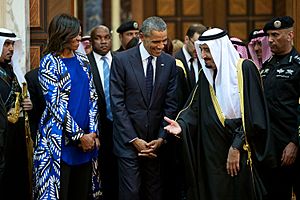
Soon after becoming king, Salman made changes to the government on 30 January 2015. He gave a bonus of two months' salary to all Saudi government workers and military personnel, including retired people and students. He also asked citizens to "not forget me in your prayers."
In April 2021, Prince Mishaal bin Majid Al Saud, who had been the governor of Jeddah since 1997, was appointed as an adviser to King Salman.
Government Changes
One of the first things King Salman and his son, Mohammed bin Salman, did was to make the government simpler. When King Abdullah passed away, there were many government offices. King Salman changed these into just two main councils: the Council of Political and Security Affairs (CPSA) and the Council for Economic and Development Affairs (CEDA). This helped to make decisions faster and more organized.
Yemen Conflict and Aid Efforts
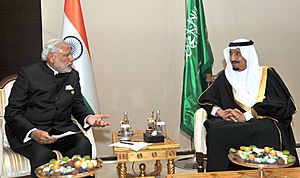
In March 2015, King Salman ordered military action in Yemen. This was to support the government against a group called the Houthis. Saudi Arabia formed a group of ten other countries to help. This was the first time the Saudi Air Force had launched airstrikes against another country since the Gulf War in the early 1990s.
The conflict in Yemen has caused a lot of suffering. By the end of 2021, it was estimated that 377,000 people had died because of the war.
To help those affected by conflicts and disasters, the King Salman Center for Relief and Humanitarian Aid (KSRelief) was created in May 2015. KSRelief works with the United Nations and other groups to deliver aid around the world. By June 2018, KSRelief had completed over 400 projects in 40 countries, spending $1.8 billion.
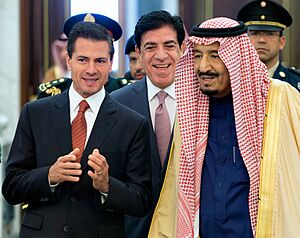
KSRelief has done a lot to help people in Yemen. They have provided training for women to help them earn money. They also have a program to help children affected by the war. In 2018, KSRelief provided medical services to over 2.5 million Yemenis.
KSRelief also helps refugees from Syria and Palestine. In 2019, they signed agreements to support families affected by war and help Syrian refugees living in poverty. In 2020, KSRelief rebuilt a camp for Syrian refugees that had been destroyed. In 2021, KSRelief and UNESCO started a project to help teachers in Lebanon. In 2022 and 2023, KSRelief continued to provide food and medical aid in many countries, including Sudan, Bangladesh, and Indonesia.
Changes in Crown Prince Position
In April 2015, King Salman appointed his nephew, Muhammad bin Nayef, as the new Crown Prince. He also made his son, Mohammed bin Salman, the Deputy Crown Prince. This meant that most of the power under the king was held by these two princes.
On 21 June 2017, King Salman changed the line of succession again. He removed Muhammad bin Nayef and named his son, Mohammed bin Salman, as the new Crown Prince. Mohammed bin Salman is now seen as a very powerful figure in Saudi Arabia.
In September 2022, King Salman stepped down from his role as Prime Minister, giving this position to his son, Mohammed.
Human Rights Initiatives
In April 2020, the Saudi Supreme Court announced an important change. Under a royal order from King Salman, minors (people under 18) who commit crimes will no longer face execution. Instead, they will be sent to a juvenile detention center for a maximum of 10 years. This was a significant reform.
Foreign Relations
King Salman has focused on Saudi Arabia's relationships with other countries. In January 2016, Saudi Arabia executed a Shia cleric named Sheikh Nimr. This caused tension with Iran.
Saudi Arabia has also supported rebel groups fighting against the government in Syria. In May 2019, King Salman hosted meetings with leaders from Gulf and Arab states. He accused Iran of threatening global oil supplies and shipping. He urged other countries to "use all means to deter this regime."
In recent years, Saudi Arabia has also been working to improve its relationship with Israel. This effort aims to create a stronger alliance against threats from Iran.
Influence and Media
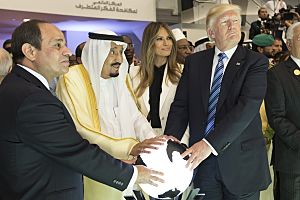
Salman has often helped solve disagreements among the many princes of the Al Saud family. He was an important member of the royal council, which helped decide which princes would be given different responsibilities in the Kingdom.
Salman and his family own a media group that includes newspapers like Asharq Al-Awsat and Al Eqtisadiah. Even though he only owns a small part of the Saudi Research and Marketing Group (SRMG), he is often seen as its main owner. He is believed to control the organization through his son, Prince Faisal.
Personal Life
Family
Salman bin Abdulaziz has been married three times and has at least thirteen children, including twelve sons.
His first wife was Sultana bint Turki Al Sudairi. They married in 1954. She had six children with him, including his only known daughter. Sultana passed away on 30 July 2011. Their children include:
- Prince Fahd (1955–2001). He was a businessman and died at age 47.
- Prince Sultan (born 1956). He made history as the first person of royal blood, the first Arab, and the first Muslim to travel to outer space in 1985. He is now the chairman of the Saudi Space Commission.
- Prince Ahmed (1958–2002). He passed away at age 43.
- Prince Abdulaziz (born 1960). He has been the Minister of Energy since 2019.
- Prince Faisal (born 1970). He is the governor of Madinah province.
- Princess Hassa (born 1974). She is Salman's only known daughter.
Salman's second wife was Sarah bint Faisal Al Subai'ai, whom he later divorced. They had one son:
- Prince Saud (born 1986).
Salman's third wife is Fahda bint Falah Al Hithlain. She has six sons with Salman:
- Prince Mohammed (born 1985). He is the current Crown Prince and Prime Minister of Saudi Arabia.
- Prince Turki (born 1987).
- Prince Khalid (born 1988). He has been the Minister of Defence of Saudi Arabia since 2022.
- Prince Nayef
- Prince Bandar
- Prince Rakan
Health
King Salman has had some health issues. In August 2010, he had spinal surgery. He has also had a stroke, which affects his left arm. In July 2020, he had successful gallbladder surgery. In May 2024, it was reported that he had a lung infection.
Honors and Awards
King Salman has received many awards and honors from different countries around the world. These awards recognize his leadership and his efforts to build relationships with other nations.
| Country | Collar | Order | Year | Ref. |
|---|---|---|---|---|
| Collar of the Order of Sheikh Isa bin Salman Al Khalifa | 2017 | |||
| Royal Family Order of the Crown of Brunei (D.K.M.B.) | 2017 | |||
| Grand Cordon of the Order of National Star of Djibouti | 2015 | |||
| Collar of the Order of the Nile | 2016 | |||
| Grand Cordon of the National Order of Merit | 2015 | |||
| First Class of the Star of the Republic of Indonesia | 2017 | |||
| Grand Cordon of the Order of the Chrysanthemum | 2017 | |||
| Collar of the Order of Al-Hussein bin Ali | 2017 | |||
| Collar of the Order of Mubarak the Great | 2016 | |||
| Collar of the Order of Kuwait | 2016 | |||
| Honorary Commander of the Order of the Defender of the Realm (P.M.N.) | 1982 | |||
| Recipient of the Most Exalted Order of the Crown of the Realm (D.M.N.) | 2017 | |||
| Collar of the Order of the Aztec Eagle | 2016 | |||
| Collar of the Order of Muhammad | 2016 | |||
| Grand Cordon of the Order of Ouissam Alaouite | 1987 | |||
| Grand Cross of the National Order of Niger | 2015 | |||
| First Class of the Nishan-e-Pakistan | 2015 | |||
| Grand Cordon with Collar of the Order of Al Said | 2021 | |||
| Grand Collar of the State of Palestine | 2015 | |||
| Grand Cordon of the National Order of Merit | 1999 | |||
| Collar of the Order of the Republic | 2017 | |||
| Grand Cross of the Order of Civil Merit | 1974 | |||
| Grand Cordon of the Order of the Republic | 2019 | |||
| Collar of the Order of the State of Republic of Turkey | 2016 | |||
| Grand Cordon of the Order of the Republic | 2001 | |||
| Collar of the Order of Zayed | 2016 | |||
| Collar of the Order of Prince Yaroslav the Wise | 2017 | |||
| Grand Collar of the Order of the Golden Eagle | 2022 |
See also
 In Spanish: Salmán bin Abdulaziz para niños
In Spanish: Salmán bin Abdulaziz para niños
- List of rulers of Saudi Arabia
- List of things named after Saudi Kings § Salman
- Succession to the Saudi Arabian throne
 | Jackie Robinson |
 | Jack Johnson |
 | Althea Gibson |
 | Arthur Ashe |
 | Muhammad Ali |


